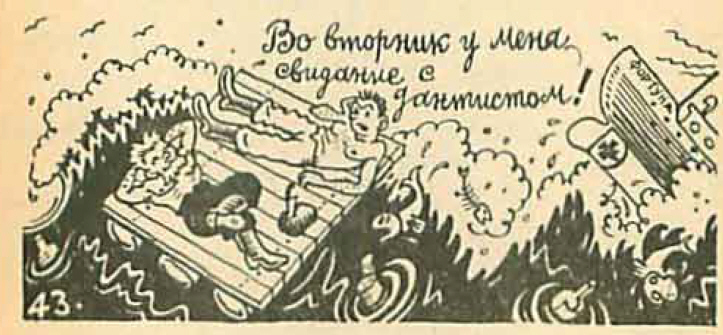
|
Languages
|
| Russian for English speakers 43 |
 |
| Lesson 43 |
|
150 |
Russian |
English Английский |
|
Сорок третий (43-й) урок |
Forty third lesson |
|
|
УРОК НОМЕР СОРОК ТРИ (№43) |
Lesson number forty three (#43) |
|
|
Семь дней (1) недели |
(The) seven days of the week | |
| 1 | Как называются по-русски семь дней недели? | How are called in Russian the seven days of the week? |
| 2 | Воскресение, понедельник, вторник, среда. |
Sunday, Monday, Tuesday, Wednesday... |
| 3 | Постойте, не всё сразу (2), a то я не запомню. | Stop, not all at-the-same-time, or I shall not remember. |
| 4 |
Скажем, сегодня (3) воскресение, день отдыха. |
Let us say, to-day Sunday, (a) day of rest. |
| 5 | Завтра понедельник, начинается рабочая неделя (4) | To-morrow Monday begins the working week. |
| 6 |
Послезавтра (После завтра) вторник, второй день рабочей недели. |
After to-morrow Tuesday, the second day of the working week (genit.). |
| 7 | Потом среда... как запомнить среду? | And then Wednesday; how (can one) remember Wednesday? (accus.). |
| 8 | Вот как : среда посередине (по середине) (5) недели : | This is how : Wednesday, in the middle (prepos.) of the week (genit.), |
| 9 | три дня до среды, и три дня после. | three days until Wednesday, and three days after. |
| 10 | Отлично; а четверг, четвёртый день? | Excellent; and Thursday, fourth day? |
| 11 | Так. И пятница, пятый день. Очень просто. | (Just) so. And Friday, fifth day. (It's) very simple. |
| 12 |
Нам остаётся только суббота (6). Как её запомнить? |
[For us] (there) remains only Saturday. How (can one) remember it? |
| 13 | Разве (7) вы не знаете, что суббота праздник у (8) Евреев? | Is it possible that you don't know that Saturday (Sabbath) is a festivity among the Jews? |
| 14 |
Давайте повторим : Воскресение, понедельник, вторник, среда, четверг, пятница, суббота. Вот и всё! |
[Give] let's repeat : |
|
УПРАЖНЕНИЕ |
EXERCISE | |
| 1 | В воскресение народ гуляет и развлекается. | On [in] Sunday, people walk-about and divert themselves. |
| 2 | В понедельник трудно встать рано, чтобы идти на работу. | On [in] Monday, (it is) difficult to get up early to go to work. |
| 3 | Во вторник у меня свидание с дантистом. | On [in] Tuesday, I have an appointment with the dentist. |
| 4 | В среду вечером мы пойдём в цирк. | On [in] Wednesday (accus.) evening, we shall go to the circus. |
| 5 | Я вам заплачу после дождика в четверг. | I shall pay you at the blue moon [after the shower on Thursday]. |
| 6 | В пятницу утром меня дома не будет. | On [in] Friday (accus.) morning I shall not be (negat. genit.) at home. |
| 7 | В субботу я уеду в деревню. | On [in] Saturday (accus.) I shall go away to the country. |
|
After в, the names of the days are in the accusative. |
| ДОБАВОЧНОЕ УПРАЖНЕНИЕ |
ADDITIONAL EXERCISE |
|
| 1 | Один раз ог Раз. |
One time. Once. |
| 2 | Два раза. | Twice [two times]. |
| 3 | Пять раз. | Five times. |
| 4 | Сколько раз? | How many times? |
| 5 | Разве вы его не знаете? | Do you really not know him? |
| 6 | Ничего нам не остаётся. | We have nothing left. |
| 7 | Меня не будет дома от четверга до субботы. | I shall not be (negative genitive) at home from Thursday (genit.) to Saturday (genit.). |
| 8 | Я вернусь в субботу вечером. | I shall come back on [in] Saturday (accus.) evening (instr.). |
| 9 | Как это называется? | What [how] is this called? |
| 10 | Как его фамилия? | What is his name? |
| Постойте! | Stop! | |
| Нельзя всё делать сразу | one can't do everything at once. | |
| От сегодняшнего дня | from to-day. | |
| Разве он Еврей? | Is he a Jew by any chance? | |
| Вот и всё | and that's all. | |
| После дождика в четверг | once in a or at the blue moon. | |
|
(Дождь,
the rain; дождик,
light rain, shower. |
|
NOTES - ЗАМЕТКИ |
AK-NOTE |
|
| 1 | See less. 42, par. 4. | |
| 2 |
Раз, or
один раз:
once. |
"помн" is not a root. There is "мн " which is more like radical, cf. "мнить" - to think, to fansy, to imagine. по+мнить is something like "to by think" or "to fancy for some time". It's one of core words that you must just "dig-in" into. |
| 3 |
Сегодня,
to-day, is, literally "of this day". |
|
| 4 |
Работа,
work, gives the adjective рабочий
(рабочая, рабочее),
of work, working. |
I've mention "radical" above, so here's an explanation of
it: раб (slave),
работа (work,
job), работать
(to work) has a "ра"
radical. |
| 5 |
Середина,
the middle; |
|
| 6 | Суббота: the Sabbath, or Saturday. | |
| 7 | Разве, is it (possible) that, with surprised expression. (= by any chance). | |
| 8 |
Еврей
('evrei) a Jew. |